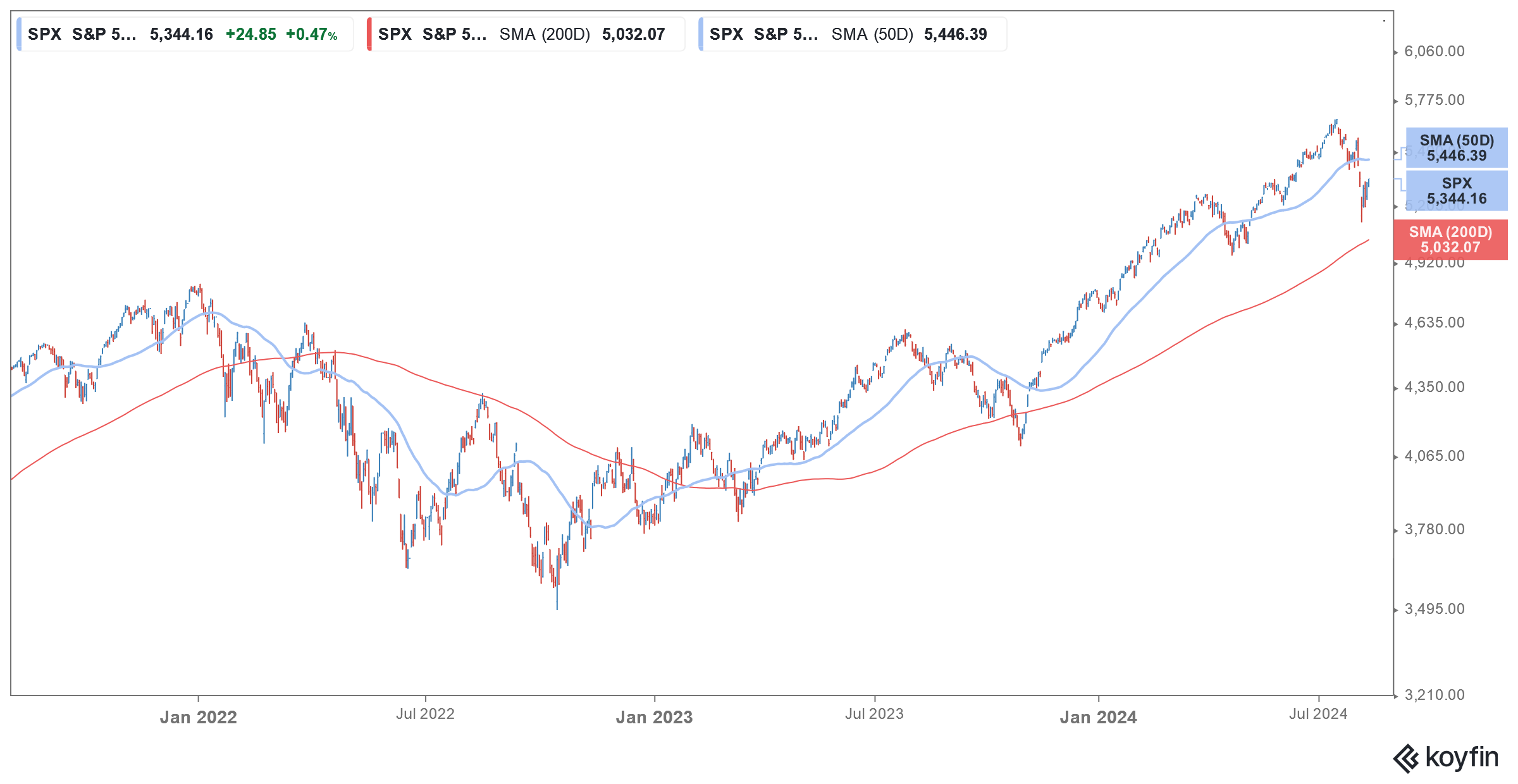
The first half of 2024 was remarkable for US share markets as while both the S&P 500 and Nasdaq delivered double-digit returns the volatility was significantly below historical averages. However, things changed last week and while the S&P 500 closed almost flat, it was the most volatile week for the index this year.
The week began on a sombre note and the S&P 500 fell 3% on Monday which was the index’s worst performance since 2022. The Cboe volatility index which is also known as the “fear gauge” rose to the highest level since 2020 that day before settling lower.
US share markets were quite volatile last week
Markets were spooked by several factors including a rate hike by the Japanese central bank, fears of a US recession after soft July employment numbers, and tepid corporate earnings. Notably, the valuations of US tech shares have risen over their historical averages, in part because of optimism towards their artificial intelligence (AI) features. However, markets have now started questioning the massive investments that tech giants have been making in building their AI infrastructure.
Meanwhile, after the Monday crash, US shares recovered and with a gain of 2.3% on Thursday, the S&P 500 had its best day since 2022. Yields on US government bonds also whipsawed as traders weighted the probability of a Fed rate cut.
US share markets inched up on Friday and the S&P 500 – which fell into correction territory on Monday – briefly turned positive for the week. The index closed only marginally lower but that does not mask the massive intra-week volatility that we saw during the week.
What caused the share market sell-off?
Infrastructure Capital Advisors CEO Jay Hatfield believes that the “hedge fund theme” was responsible for the market sell-off last week instead of selling from long-term investors. He said, “So it makes sense that we bounce back. A volatile sell-off and bounce back is just normal August [and] September behavior; thin markets, hedge funds gone wild and irrational moves down. The recent market activity has no bearing on our long-term outlook.”
Warren Buffett has also been on a share-selling spree
Meanwhile, Berkshire Hathaway which is led by Warren Buffett, surprised markets after its Q2 earnings showed that the company sold $75 billion worth of shares in the quarter. The conglomerate’s cash pile soared to a new record high of $277 billion after seven consecutive quarters of net selling.
With Buffett, who is among the best value investors of all time, selling shares so rapidly, the concerns over share markets getting overheated got ignited. Berkshire repurchased only $345 million worth of its shares in Q2 which is significantly below what we saw over the last few years.
James Shanahan, an Edward Jones analyst who covers Berkshire, termed Buffett selling shares as a “really bad signal.” He added, “This looks alarming because you have a large and sophisticated investor with a really impressive long-term track record not putting any of his cash to work to buy stocks, and in fact, is massively liquidating.”
Fed meeting is scheduled for September
Fed’s next policy meeting on Sept. 17-18 and traders polled by CME Group’s FedWatch Tool are almost evenly divided between a 25-basis point and a 50-basis point rate cut at that meeting.
According to Michael James, managing director of equity trading at Wedbush Securities, “There is going to continue to be a significant amount of uncertainty and anxiety hanging over the market for the course of the next month until we get to the next Fed meeting.”
Notably, over the last couple of months, Fed officials have sounded amenable to a September rate cut. Speaking at the Economic Club of Washington D.C. in July, Fed chair Jerome Powell said that the Fed won’t wait for inflation to fall below 2% before it starts cutting rates.
The US central bank raised rates four times in 2023 by 25 basis points each. Currently, the Fed fund rates are 5.25%-5.50% which is the highest since 2001.
Fed is also worried about a slowdown in the US economy
During his Senate testimony in July, Powell also talked about the risks of cutting rates too late, hinting that with inflation now gradually falling towards its target, it is also worried about a slowing US economy.
In his prepared remarks for the Senate testimony earlier this month, Powell said, “Reducing policy restraint too late or too little could unduly weaken economic activity and employment.”
He added, “In light of the progress made both in lowering inflation and in cooling the labor market over the past two years, elevated inflation is not the only risk we face.”
US inflation data will be released next week
Next week, US CPI data will be released which would provide more insights about inflation. Notably, with inflation gradually falling, markets now seem more worried about a slowing US economy and the softness in labor markets.
According to Scott Ladner, chief investment officer at Horizon Investments, “The market’s caring much more about labor markets and growth, than they do inflation right now.” He added, “Should inflation come in like monstrously hot that’ll matter, but outside of something really, really on the fringes, it seems like the inflation story is sort of played out.”
Ladner, who believes that the Fed’s rate cuts could help spur the next round of growth in the US, said, “This is an economy which is slowing, but not slow. It’s a labor market that is weakening, but not weak. And it’s a consumer which is in an objectively strong spot with very little leverage on their balance sheets.”
All said, most market observers see US share markets to remain volatile in the coming months as investors brace for the November presidential elections.


Question & Answers (0)